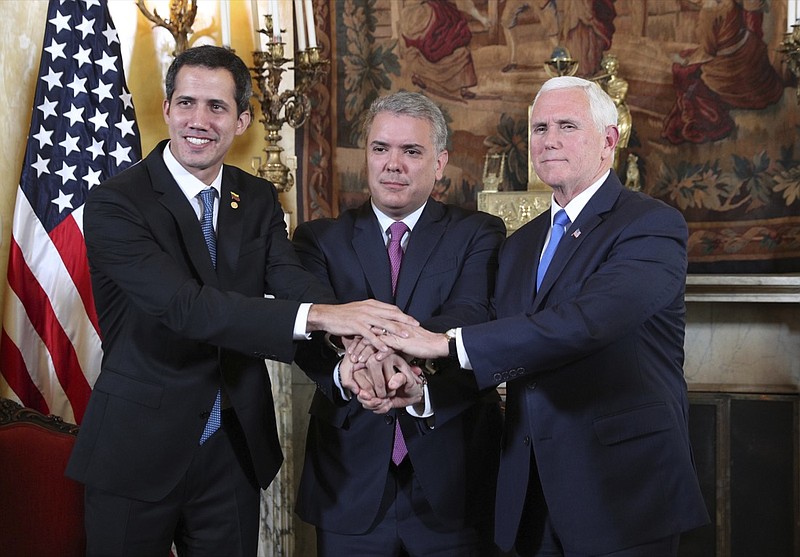BOGOTA, Colombia (AP) - The Trump administration on Monday announced new sanctions on allies of Venezuela's Nicolas Maduro as it struggles to find new ways to boost his opponent Juan Guaido after an effort to deliver humanitarian aid to the economically devastated nation faltered amid strong resistance from security forces who remain loyal to the socialist leader.
Vice President Mike Pence arrived in the Colombian capital for an emergency summit of regional leaders to discuss the deepening crisis and immediately met with Guaido, who the U.S. and 50 other nations recognize as Venezuela's rightful leader.
In a speech to the group, Pence urged regional partners to freeze oil assets controlled by Maduro, transfer the proceeds to Guaido and restrict visas for Maduro's inner circle. He said the U.S. was imposing more sanctions on four pro-government governors, including a close Maduro ally who negotiated the release of an American in jail more than two years.
"It's time to do more," said Pence. "The day is coming soon when Venezuela's long nightmare will end, when Venezuela will once more be free, when her people will see a new birth of freedom, in a nation reborn to libertad."
Pence's appearance before the Lima Group comes at an important crossroads for the coalition of 14 mostly conservative Latin American nations and Canada that has joined forces to pressure Maduro. A month after Guaido declared himself interim president at an outdoor rally, hopes that support for Maduro inside the military would quickly crumble have faded.
Over the weekend, security forces on the borders with Colombia and Brazil fired tear gas and buckshot on activists waving Venezuelan flags while escorting trucks with emergency medical and food kits. Four people have been reported killed and at least 300 wounded, although only a few were hospitalized.
While Colombian authorities said more than 160 soldiers deserted their posts and sought refuge across the border over the weekend, the highest-ranking among them was a National Guard major. No battalion or division commanders have come forward to challenge Maduro despite almost-daily calls by Guaido and the U.S. to do so.
That's left many asking what Guaido and the U.S. can do to break the stalemate.
For now, the U.S. is showing no signs it is considering a military intervention to remove Maduro.
During his visit, Pence repeated President Donald Trump's threat that "all options are on the table" but gingerly avoided talking about the potential for military action.
Instead, he stuck to traditional policy tools that so far have only hardened Maduro's resolve. Foremost among them was the addition of four governors to a growing list of more than 50 Venezuelan officials under sanctions and blocked from doing business or having accounts in the U.S.
The most prominent target was Rafael Lacava, the governor of central Carabobo state who played a key role negotiating the release last year of Joshua Holt, a Utah man who traveled to the South American country for love and ended up in jail, without a trial, for two years on what were seen as trumped-up weapons charges.
Pence also said the U.S. would continue to search for places to pre-position aid for eventual delivery to Venezuela, and announced $56 million in new assistance to countries in the region helping to absorb an exodus of more than 3 million Venezuelans who have fled hyperinflation and shortages in recent years.
"In the days ahead, the United States will announce even stronger sanctions on the regime's corrupt financial networks. We will find every last dollar they have stolen and return that money to the Venezuelan people," he said.
Guaido, in his visit to the Colombian capital, was afforded all the trappings of a head of state. He posed for selfies with well-wishers upon arriving for the summit and stood before a pile of aid boxes stamped with the U.S. flag as he and Pence greeted a group of Venezuelan migrants, one of whom, an elderly man, wept as he shook hands with the U.S. vice president and pleaded for help.
But his speech to the diplomats was short on specifics despite speculation he would request a military intervention as a close ally, Julio Borges, the opposition ambassador to the Lima Group, suggested on Sunday.
"Being permissive with the usurpation of power would be a threat to democracy in all of America," he said.
Meanwhile, several Latin American leaders who have been staunchly behind Guaido also rejected the use of force.
"Let's hope that the pressure of the international community, dialogue and prudence will prevail," said Panamanian President Juan Carlos Varela, who likened the crisis in Venezuela to what his country faced in the run up to the 1989 U.S. invasion to remove dictator Manuel Noriega. "Although the circumstances are similar, we must have the capacity to find a solution different than the one used back then."
Secretary of State Mike Pompeo, in interviews on "Fox News Sunday" and CNN's "State of the Union," did not rule out U.S. military force but said "there are more sanctions to be had."
Any additional sanctions will increase the suffering of the Venezuelan people and may lead to more political violence, said Mark Weisbrot, the co-director of the Center for Economic and Policy Research, who advocates a negotiated end to the political crisis.
"The 'humanitarian aid' this weekend was a public relations stunt, since the aid was just a tiny fraction of the food and medicine that they are depriving Venezuelans of with the sanctions," Weisbrot said. "As the Trump administration admitted, it was an attempt to get the Venezuelan military to disobey Maduro. It was a farce, and it failed."
